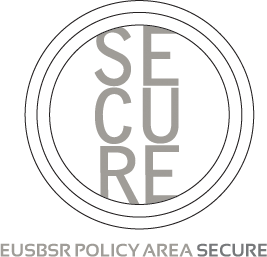Ulrika Postgärd , Swedish Civil Contingencies Agency MSB

Sonja and Ulrika were participants from Sweden, working at the Swedish Civil Contingencies Agency MSB. Their fields of work, however, are quite different. Sonja is a marine eco – toxicologist who coordinates the work with oil spill preparedness and works closely with rescue services, county administrative boards, other agencies, as well as taking part in the EU projects. One of her current tasks includes the work on developing a new strategy for Sweden in oil spill response.
In her work Ulrika is dealing mainly with natural hazards – it could be flooding, forest fires, landslides, also climate change issues and climate adaptation. She works closely with municipalities as well, as well as with the prevention and research issues trying to get new ideas and cooperate with academia.
ULRIKA: I mostly liked the first part of the programme that took place in Stockholm. During that module we learned about creative ways of getting project ideas, as well as reflected on various ways to think about leadership. This module gave us something new, various methods, more creative ones. We are thinking to organise a lunch seminar on what we learned to our colleagues at the agency, to bring the knowledge further. Such simple ideas like the apple method that we learned can become a real mind-changer in your daily work. We learned that quantity is a quality and that you have to think in many new ways and that it takes a while before you really new innovative ideas come up.
SONJA: I understood that there is a lot of room for one to become more dynamic even at our home agency. Even more so, I realised that there is nothing what is hindering this. It is just a matter of learning new methods and spreading this way of working to others as well. We feel like ambassadors now. We want to spread this at our agency further so we could all become more dynamic.
ULRIKA: It was interesting also to visit Brussels, to see the European Parliament, meet officials from different Directorate Generals of the European Commission. I have been in Brussels before on various occasions, this time, however, it was particularly interesting to see what their point is specifically on the Baltic Sea region cooperation in civil protection, and what advises can they give to us as potential project implementers.
SONJA: Meetings with them gave an outlook to the future, as it allows to see in what way European officials see it, in which direction they work. This was really useful. Now I can relate that what I do to the broader picture and keep it on the right track instead of doing something that doesn’t match with the overall context.
ULRIKA: civil protection people need this kind of wide experience because it is important to see the whole picture, and to see your part in the bigger picture. This helps you to understand that you can’t just work alone in another place, your approach needs to be integrated. You have one small part in the entire European Union, and you have to try and figure out how to work together with others in various areas. It is like as if you were a part of a big puzzle. But location of yourself in it would necessarily help you to do your work better. You can’t stay isolated from other countries in the Baltic Sea region either. You have to work together. To come up with good ideas for cooperation.
SONJA: On the national level we now have a high pressure to become more effective, as resources are not growing but the need for effective work in civil protection is there. In the past we have been doing a lot of parallel work around the Baltic Sea region, at least in my field of expertise, for instance, each developing our own modules instead of making one together. Now we understand that continuing in this way does not pay off. There is so much we can learn from one another and make the results better. Baltic Leadership Programme contributes largely to these efforts by bringing people together, but also by providing them with tools on how to achieve cooperation. On personal level I learned a lot of new things, my toolbox now is much bigger – I will be using it every time I will have a task to arrange a workshop, for instance.
ULRIKA: The network that we created here is undoubtedly one of the main successes of the programme. But there still is room for improvement in the way how our organisations, our countries think about cooperation. We need to realise that we share the same risks and problems. We need to work together. It doesn’t help if one country deals with their problems. It may be better to change the technique and change things in another country to really get the environment better. To come together and try to solve common problems, I think, would be the real leadership. How to do that – that is another question. One way to achieve this, is to try to cooperate in various areas. Then it would be easier to come up with new ideas how to commonly solve problems in the longer run, in the future.
SONJA: The key here is cooperation. We need to lead the way together in this region.

